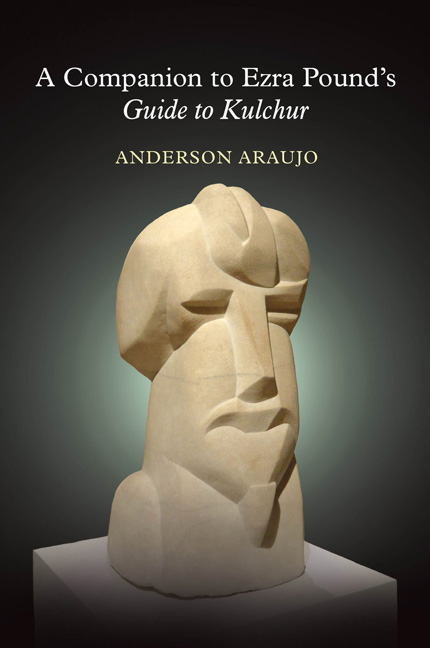Book contents
- Frontmatter
- Contents
- Acknowledgments
- Abbreviations
- Introduction
- Guide to Kulchur
- Part I
- Section I
- Section II
- Part II
- Section III
- Section IV
- Part III
- Section V
- Section VI
- 22 Savoir Faire
- 23 The New Learning: Part Two
- 24 Examples Of Civilization
- 25 Books “About”
- 26 On Answering Critics
- Part IV
- Section VII
- Section VIII
- Section IV
- Part V
- Section X
- Section XI
- Part VI
- Section XII
- Section XIII
- Addenda: 1952
- Notes
- Index
23 - The New Learning: Part Two
from Section VI
- Frontmatter
- Contents
- Acknowledgments
- Abbreviations
- Introduction
- Guide to Kulchur
- Part I
- Section I
- Section II
- Part II
- Section III
- Section IV
- Part III
- Section V
- Section VI
- 22 Savoir Faire
- 23 The New Learning: Part Two
- 24 Examples Of Civilization
- 25 Books “About”
- 26 On Answering Critics
- Part IV
- Section VII
- Section VIII
- Section IV
- Part V
- Section X
- Section XI
- Part VI
- Section XII
- Section XIII
- Addenda: 1952
- Notes
- Index
Summary
The Forschungsinstitut in Frankfurt: The origin of Frobenius's Forschungsinstitut fur Kulturmorphologie (Research Institute for Culture Morphology) in Frankfurt dates to 1898, when he founded the “Afrika Archiv” (Africa Archive) in Berlin as a private foundation. In 1920, the archive moved to Munich, where the Forschungsinstitut was formally established. Five years later, the Institute relocated to Frankfurt and became associated with the Johann Wolfgang Goethe- Universitat, where Frobenius held a lectureship in culture and ethnology. In 1946, the Forschungsinstitut was renamed Frobenius-Institut, and it continues to host ethnological and anthropological research in Africa, eastern Indonesia, and Oceania.
If Fr. Di Milano and Besard … melodic conjunctions from the violin solo: Italian composer and lutenist, Francesco da Milano (1497–1543), and French composer and lutenist, Jean- Baptiste Besard (c.1567–c.1617). Besard was the author of the ten-volume anthology of lute music Thesaurus harmonicus (1603), containing lute songs and pieces for lute ensemble by a number of composers, including fantasias and other pieces by the English Renaissance lutenist, John Dowland (1563– 1626). More significant is Pound's allusion to the same score of Munch's violin and piano version of Francesco's lute score of Janequin's La canzone degli ucceli (The Song of the Birds), the violin line of which is featured in Canto 75 (75/470–71). In ABC of Reading, Pound comments on these musical adaptations of Janequin's canzone, noting that “Francesco da Milano reduced it for the lute, the birds were still in the music. And when Munch transcribed it for modern instruments the birds were still there. They ARE still there in the violin part. That is why the monument outlasts the bronze casting.” In an article written in Italian for Il Mare of November 18, 1933, Pound praises the second concert held four days earlier at Rapallo's Town Hall, featuring Olga Rudge and Munch, as “a veritable artistic event.” Among Munch's arrangements performed that evening, Pound highlights Besard's version of Dowland's Chorea Anglicana and Francesco's adaptation of Janequin's Canzone (cf. note GK 60).
- Type
- Chapter
- Information
- A Companion to Ezra Pound's Guide to KulcherGuide to Kulcher, pp. 193 - 201Publisher: Liverpool University PressPrint publication year: 2018



